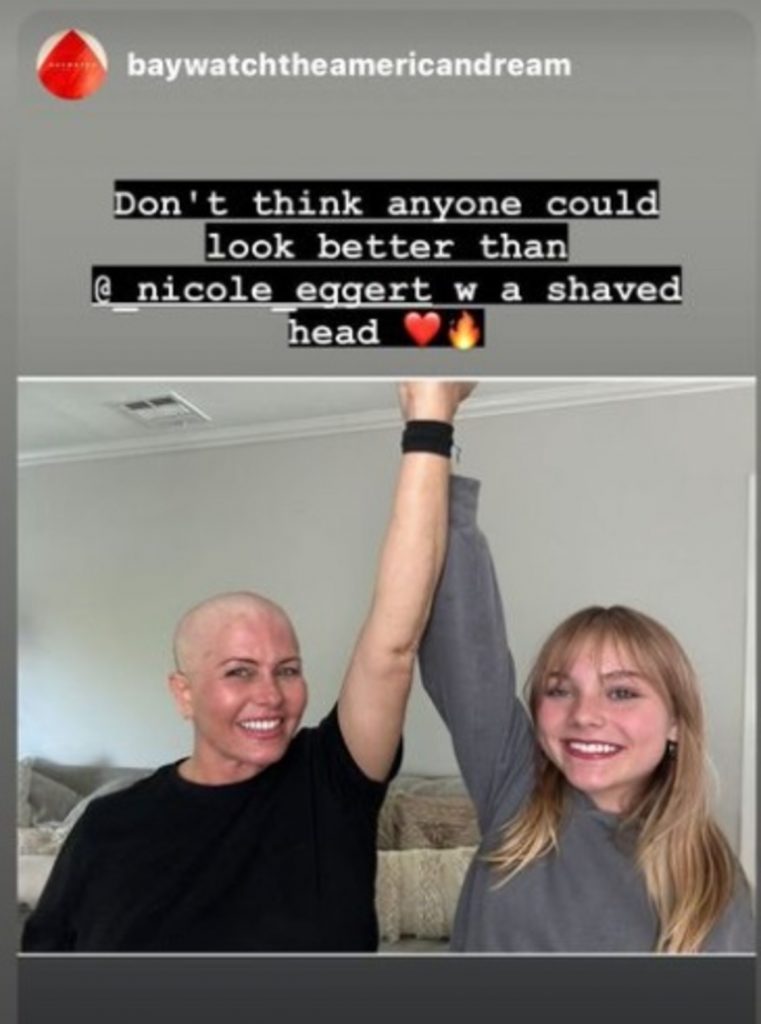Finding Strength to Endure Breast Cancer Fight
- “Baywatch” star Nicole Eggert, 52, shares an empowering video on social media of herself cutting off her hair amid ongoing treatment for stage 2 breast cancer.
- Losing your hair or seeing it thinning is often a side effect of some cancer treatments. It usually begins about three to four weeks after chemotherapy and continues throughout treatment.
- Many people going through cancer treatment feel a sense of dread associated with losing their hair, making this stage of the journey very emotional. Such a drastic physical change may lead to anxiety and sleepless nights.
- Fortunately, your hair regrows shortly after finishing treatment, but the experience can bring a lot of emotions for women. New York-based psychiatrist Dr. Samantha Boardman suggests connecting with others in a similar situation to help cope.
- While no treatments guarantee your hair won’t fall out during or after chemotherapy, scalp-cooling caps and minoxidil (Rogaine) may help.
“Baywatch” star Nicole Eggert, 52, who is battling stage 2 breast cancer, turned to social media to share one of the most sensitive parts of a cancer journey – hair loss. To the ruckus sounds of the Beastie Boys’ “Fight for Your Right,” Eggert is seen dressed in black, shaving her head.
Hair loss is one of the most challenging stages of a cancer journey because hair is so emotionally connected to one’s identity. To share this often-private moment with her fans shows Eggert’s bravery and courage.

“Bad. Ass. Yes, you are. And stunningly gorgeous with or without hair!” podcaster Erika Eleniak commented on Instagram.

“Beautiful! You got this so many of us are on the other side and are doing great! You will there as well!” Instagram user Olivia Grochowski commented.
“Still a badass beauty,” Instagram user Demond Hawkins commented.
Resources on Hair Loss Options During Cancer Treatment
How to Navigate One of the Most Emotional Steps During a Cancer Journey
Hair loss is challenging for women and men alike, but it can be incredibly difficult for cancer patients. Losing your hair or seeing it thinning is a common side effect of some cancer treatments.
Chemotherapy can cause hair loss. It usually begins about three to four weeks after starting chemotherapy and continues throughout treatment.
It happens because this treatment targets quickly dividing cells throughout the body. That includes cancer cells but also hair cells.
“For cancer patients, losing one’s hair can be unbelievably stressful. To start with, the dread of losing one’s hair can lead to some sleepless nights and feelings of anxiety,” Dr. Samantha Boardman, a New York-based psychiatrist and author, told SurvivorNet.
WATCH: Hair loss during chemo.
To better cope with this emotional stage of the journey, Dr. Boardman suggests reaching out to other survivors who have been through a similar situation.
Radiation is another treatment that can lead to hair loss if the hair is in the path of the tumor being treated. Radiation for a brain tumor, for example, may cause hair loss.
“If you do lose hair, it will regrow several weeks or months after treatment,” radiation oncologist Dr. James Taylor told SurvivorNet.
“Fortunately, for most patients, hair loss is not a concern when having radiation therapy,” Dr. Taylor continued.
Fortunately, hair loss during cancer treatment is not all bad news. Most people can expect regrowth four to six weeks after treatment. However, when your hair grows back, you may notice some changes in its color and texture.
If losing your hair is a concern for you before cancer treatment, know you have options like wigs, hats, wraps, and scarves, among other things.
Another option that can minimize hair loss is cryotherapy, “just a fancy way for saying cold therapy,” says Dr. Renata Urban, gynecologic oncologist at the University of Washington in Seattle.
Cryotherapy involves wearing cold caps or special cooling caps before, during, and after each chemotherapy treatment.
WATCH: What is a scalp-cooling device?
The caps, which are tightly fitting and strap-on helmet-style, are filled with gel coolant chilled to negative (-15) to (-40) degrees Fahrenheit.
The caps “cause vasoconstriction, or a narrowing of the blood vessels bringing blood to the scalp,” Dr. Urban explains. By constricting the blood flow to the scalp, the caps limit the amount of circulating chemotherapy that reaches the hair follicles, protecting them from some of the chemo’s damaging effects.
The cold also decreases the activity of the hair follicles, slowing down cell division and making them less affected by chemotherapy medicine.
“This has been shown to reduce hair loss by 50 percent,” Dr. Urban says. “I do try to let patients know it’s not a 100 percent prevention strategy, and it’s not been studied in all hair types, but it is at least an available strategy for patients to try.”
Keep in mind you will be experiencing some cold temperatures. Some women find the caps give them a headache. To help withstand the chilly temps, some women will dress warmly and bring blankets.
Remember to always talk with your doctor about potential treatments to mitigate the loss and the resources you have available to handle it.
Eggert’s Brave Cancer Journey
Eggert was diagnosed with stage 2 cribriform carcinoma breast cancer after discovering a lump in her breast while performing a self-breast exam. This type of exam is an easy way to keep watch for anything abnormal regarding your breasts. It involves feeling the breast for any swelling, bulging, or changes in the shape of the breast or nipple. Checking for signs of redness, rashes, or discharge is also part of this exam. If anything is found to be concerning, you should contact your doctor. It’s important to note that self-exams should be done with regular mammograms.
View this post on Instagram
Eggert said she began experiencing “terrible pain” and rapid weight gain that she first dismissed for signs of menopause. However, after she discovered a lump during a self-exam, a mammogram and multiple biopsies confirmed that she had breast cancer.
The rare type of breast cancer Eggert has is often slow-growing and low-grade, according to Breast Cancer Now.
“I can definitely feel it. It’s there. It needs to be taken out. So it’s just a matter of do I have to do treatment before the surgery or can they perform the surgery and then I do the treatment after,” Eggert told People.
Eggert is anticipating chemotherapy and radiation therapy for treatment.
The best course of treatment will likely be determined based on the initial tests the “Charles in Charge” star received upon her diagnosis.
Questions to Ask Your Doctor
If you’re going through cancer treatment and experiencing hair loss, here are some questions you may consider asking your doctor:
- Are there any treatments to help manage or minimize my hair loss?
- What are scalp-cooling devices, and how do they work?
- Do you recommend scalp-cooling devices?
- What other options are available to help me cope with hair loss?
- Can you recommend a wig maker?
- I’m struggling mentally with my hair loss; can you recommend a therapist to talk to?
- How can I find a local support group with people going through similar things?
Learn more about SurvivorNet's rigorous medical review process.

